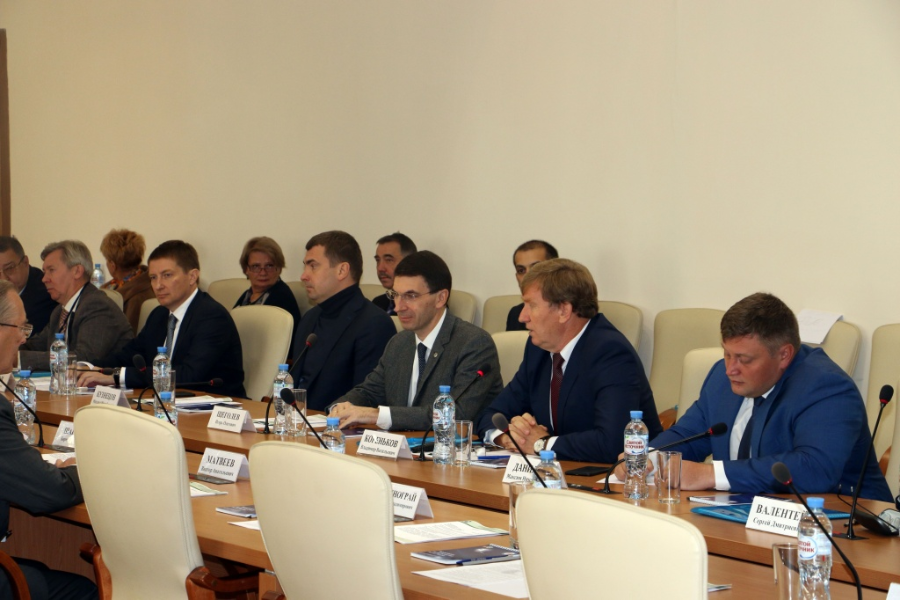Training of IT staff of the future in JINR
News, 08 October 2018
On 2 October 2018, a round table “Tendencies of development of IT education. Training of specialists for IT industry” was held in the framework of the 8th All-Russian scientific-practical conference “Principles and mechanisms of national innovative system formation” organized in the Special Economic Zone “Dubna”.
Presidential Plenipotentiary Envoy to the Central Federal District I.O. Shchegolev took part in work of the round table. Head of the Moscow Region Governor Administration M.M. Kuznetsov, Minister of Innovations of the Moscow Region V.V. Khromov and Head of the Dubna city M.N. Danilov also participated in the event. Representatives of Russian universities, IT-companies, research and engineering centres, education regulatory bodies were among participants of the round table. The Joint Institute for Nuclear Research was represented at the meeting by JINR Director Academician V.A. Matveev, JINR Vice-Director Academician B.Yu. Sharkov and Director of the Laboratory of Information Technologies Professor V.V. Korenkov who moderated the round table.
 Photo by http://oezdubna.ru/
Photo by http://oezdubna.ru/
Academician V.A. Matveev in his speech at the opening of the round table noted that thanks to the state support the Joint Institute has an opportunity to implement research projects of megascience level for which training of new highly qualified staff members and development of modern digital technologies are of crucial importance: “Accelerators and colliders are the highest achievements of accelerator physics facilities. However, no discoveries would be possible without modern information centres processing large amounts of data. It is important to us to unite efforts of the Special Economic Zone, our Institute, and leading universities of the country for training young talented specialists. Nowadays, the demand for talents is sometimes more significant than financial opportunities.”
The participants of the round table discussed how the trends in development of IT education in Russia correspond to global trends that require specialists of a completely different level in modern realities. The participants also discussed organizational issues of training elite IT staff able to participate in solving complicated scientific and social-economic tasks in the frames of mega-projects in Russia and abroad. It was noted that in order to achieve these goals, improvement of educational process is needed in both, issues of new teaching materials and techniques and issues of improvement of teaching skills.
In conclusion of the round table, in order to solve these tasks an agreement on establishment of a Consortium of research organizations, universities and IT companies “IT education – XXI century” was signed. About 20 companies became members of the new association created, as the document puts it, “in order to ensure the best compliance of the content and quality of higher education in the fields of information technologies with the world trends of development of information technologies as well as the tasks of the state concerning development of the digital economy in science, technology and engineering with the support of the Ministry of Science and Higher Education of the Russian Federation”.
Summarizing all the reports made at the round table, the Representative of the RF President highlighted that development of the IT industry and talented specialists who will develop it are the most important factors contributing to the solution of the key tasks of Russia’s innovation policy.
Continuing the visit to Dubna, I.O. Shchegolev visited the companies of several anchor residents of the Special Economic Zone as well as the Federal Data Processing Centre and the Joint Institute for Nuclear Research. At JINR, I.O. Shchegolev visited the Flerov Laboratory of Nuclear Reactions and was acquainted with the NICA collider that is being constructed in the Veksler and Baldin Laboratory of High Energy Physics. Moreover, Plenipotentiary Representative of the President of the Russian Federation visited the Laboratory of Information Technologies where a detailed excursion was organized. At the excursion, he was acquainted with the network and computing infrastructures of LIT; in particular, the “Govorun” supercomputer and the Control and Monitoring Centre of the Multifunctional Information and Computing Complex at JINR were presented.
Following the materials of SEZ “Dubna”, News 360